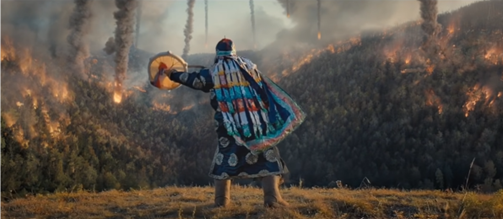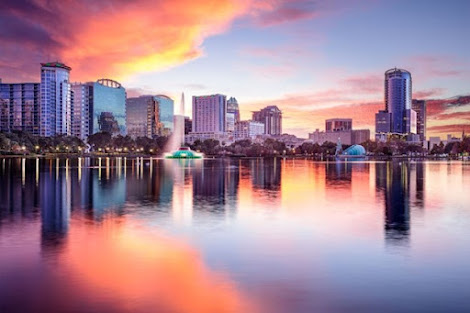“I saw a new heaven and a new earth, for the first heaven and earth had passed away.”
It is rare that I
choose the epistle as the text for my sermon. It is even more unlikely that I
would ever choose to preach on a text from the Revelation of John. It is a text
that is full of symbol and metaphor that does not readily lend itself to
ordinary discussion.
At a basic level, John of Patmos wrote this work in code that one needs a decoder ring to decipher. Problem is, he didn’t leave us the decoder ring.
John of Patmos, Sandro Boticelli (1492)
John’s goal was to communicate to fellow believers in a time of persecution in a manner that they would understand but the average reader would not. That includes us.
Many of the early versions of the Christian scripture did not include John’s Revelation. The early councils of the church wrestled with this book for years before deciding to include it in the canon. And we have been trying to figure out what it’s actually about ever since. As I often told my undergraduates when we covered this material in class, if your pastor tells you exactly what Revelation means, you should not walk away, you should run.
So why am I focusing on this writing today? I think this excerpt has something important to say to us that we need to hear in a time of tumult in the world around us.
Apocalypse: The Unveiling
Apocalyptic theologies have provided the basis for incredibly self-serving understandings like the Great Tribulation in which the real Christians are taken from Earth prior to its dramatic end while all the rest of us jerks will be, as the movies describe us: Left Behind. The spectacular visions of John’s Apocalypse - with their armies of men charging across the plains of Megiddo and armies of angels descending from the heavens, all of which ends in a fiery finale - make for great films like Hal Lindsay’s The Late Great Planet Earth.
But I suspect there is
more than titillation that feeds our interest in apocalyptic thinking. The word
apocalypse means unveiling. And by implication, apocalypses arise on the
occasion of the passing away of old paradigms and the birth of new ways of
being human. As John tells us in today’s epistle, “I saw a new heaven and a
new earth, for the first heaven and earth had passed away.”
If we allow ourselves to see it, we all recognize that much of the dirty underbelly of our way of life is currently in the process of being exposed. With the rise of body cams and cell phones, police brutality on our streets is now documented. Our self-serving politicians see their rise to power as dependent upon turning Americans against one another. The result has been a series of laws preventing any substantive discussion of racism and homophobia. This evidences a powerful denial of our collective Shadow as a people.
A New Beginning: No Need for Despair
If we are being honest with ourselves, we will have to admit that this earth as we have known it is indeed passing away. At a very basic level, the apocalyptic visions from our popular culture from zombie films to movies in which we are told “Don’t look up” to see the approaching asteroid threatening an extinction event – all these visions reveal something deep in the human soul that we already know but don’t want to consider. The world we knew and took for granted is passing away. And our visions of heaven, of a rescuing deity who will swoop down to save us from ourselves, are passing away as well.
Such realizations could readily prompt one to despair. As the artist known as Prince once counseled us, “It’s Party over, oops, out of time….So tonight we’re gonna party like it’s 1999.” And some seem to have taken that advice to heart.
But it’s important to note that even in writing these letters full of death and destruction, John of Patmos does not leave his readers in despair. Writing from a time when his world was, indeed, passing away, under the persecution of a Roman emperor he would construct as the Beast, John goes on to say that not only will there be a new heaven and earth, G-d will be present among mortals, dwelling with them as their G-d and they will be his people.
This is the time we might want to ask ourselves: What might a new earth look like? What would a new understanding of heaven and the Holy One we see as present there look like? Most importantly, what would a way of being human in which the divine permeates our lives, a way of living in which G-d’s presence would be inescapable, look like?
Taking “This Fragile
Earth, Our Island Home” Seriously
I think our other
readings today give us some hints. Psalm 48 is a hymn praising the Creator beginning
with the heavens and working its way all the way through the created order to
the wild beasts, the creeping things and the winged birds. A new earth begins
with a gratitude and an appreciation for a very good Creation, seeing ourselves
as a part of that Creation but only a part. And if we take the words of Genesis
seriously, we are called to be good partners, stewards and caretakers of the
created order.
The threat of extinction posed by climate change reminds us that our presence on this planet is not a given. A new earth will require humanity to take the gift of “this fragile earth, our island home” seriously. It will require a new way of being human. I believe we are entirely capable of doing so. But the alternative is untenable.
Our reading from the Acts of the Apostles gives us suggestions about how we are to relate to one another. In a world where our news media is filled with images of destroyed apartment buildings and floods of refugees and our social media is filled with demonic images of those we designate as our enemies, a new earth in which G-d dwells among us seems far away.
Domenico Fetti, “Peter’s Vision of a sheet with animals” (1619)
That was true for Saint
Peter in the days following Jesus’ departure as well. He had been trained to
see everyone outside his sect within the Hebrew faith as unclean, people to be
avoided. But Peter has a dream that draws that understanding into question. Cast
in terms of dietary restrictions G_d says to Peter, “What God has made clean,
you should not call profane.” In other words, your prejudices against all those
outside your tribe must be reconsidered. In a new earth, humanity will not have
the luxury of engaging in a self-serving tribalism that sees outsiders as less
than fully human.
Finally, in John’s Gospel today, we get Jesus’s last words to his disciples as he prepares to depart the world for the final time. “I give you a new commandment, that you love one another. Just as I have loved you. By this everyone will know that you are my disciples…”
Note what Jesus does not say here. He does not say “Believe the right things.” He does not say “Castigate those who don’t share your understandings wrapping self-righteousness under a banner of orthodoxy.” He doesn’t say invite people to your altars only after you’ve checked their IDs to confirm they’ve been baptized. He simply says, love them, warts and all. That’s how people will know you are my followers. If those of us who would follow Jesus are going help create a new earth, it will have to begin with this. Loving profligately, recklessly, unconditionally.
Resurrection Comes After
Death
So here is how I see it. We live in apocalyptic times. The seamy underbelly of our lives is being revealed. The way of being human that we have taken for granted has reached its expiration date. That includes the way we envision the Holy. The old heaven and earth are passing away as we speak. And a new heaven and earth are being born.
This is not a new phenomenon nor is it foreign to us. This is the fifth Sunday of Easter, a season that celebrates resurrection. But like all resurrections, it was predicated upon death. It is necessary for the old to die for the new to come into being.
If we as a people prove willing to live into the challenges these changes present us, we may well come to know the reality of a world in which G-d will dwell among mortals. But that will come only on the other side of much change, some of which will be painful.
The good news is that
we do not have to do this alone, G-d is always present with us. And all we are ever
called to do is our part. As our Baptismal Covenant so ably instructs us, our
answer to every true calling is always “I will with God’s help.”
Collect for Easter V: O God, whom truly to
know is everlasting life: Grant us so perfectly to know your Son Jesus Christ
to be the way, the truth, and the life, that we may steadfastly follow his
steps in the way that leads to eternal life; through Jesus Christ your Son our
Lord, who lives and reigns with you, in the unity of the Holy Spirit, one God,
for ever and ever.
Amen.
------------------------------------------------------------------------------------------------
Harry Scott
Coverston
Orlando,
Florida
If the
unexamined life is not worth living, surely an unexamined belief system, be it
religious or political, is not worth holding. Most things worth considering do
not come in sound bites.
Those who
believe religion and politics aren't connected don't understand either. – Mahatma
Gandhi
For what
does G-d require of you but to do justice, and to love kindness, and to walk
humbly with your G-d? - Micah 6:8, Hebrew
Scriptures
Do not be
daunted by the enormity of the world's grief. Do justly, now. Love mercy, now.
Walk humbly now. You are not obligated to complete the work, but neither are
you free to abandon it. - Rabbi Rami Shapiro, Wisdom
of the Jewish Sages (1993)
© Harry
Coverston, 2022
++++++++++++++++++++++++++++++++++++++++++++++++++














No comments:
Post a Comment